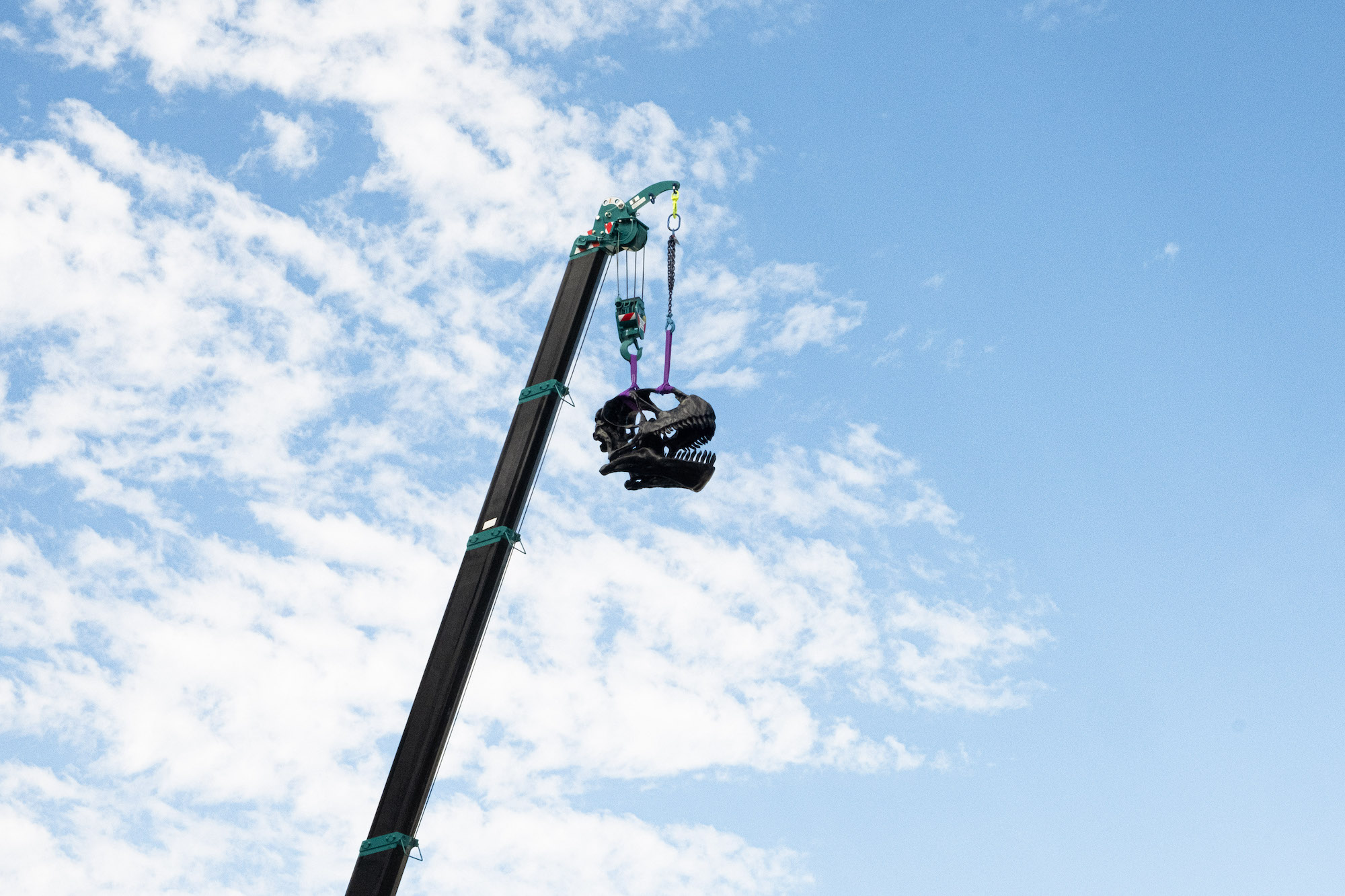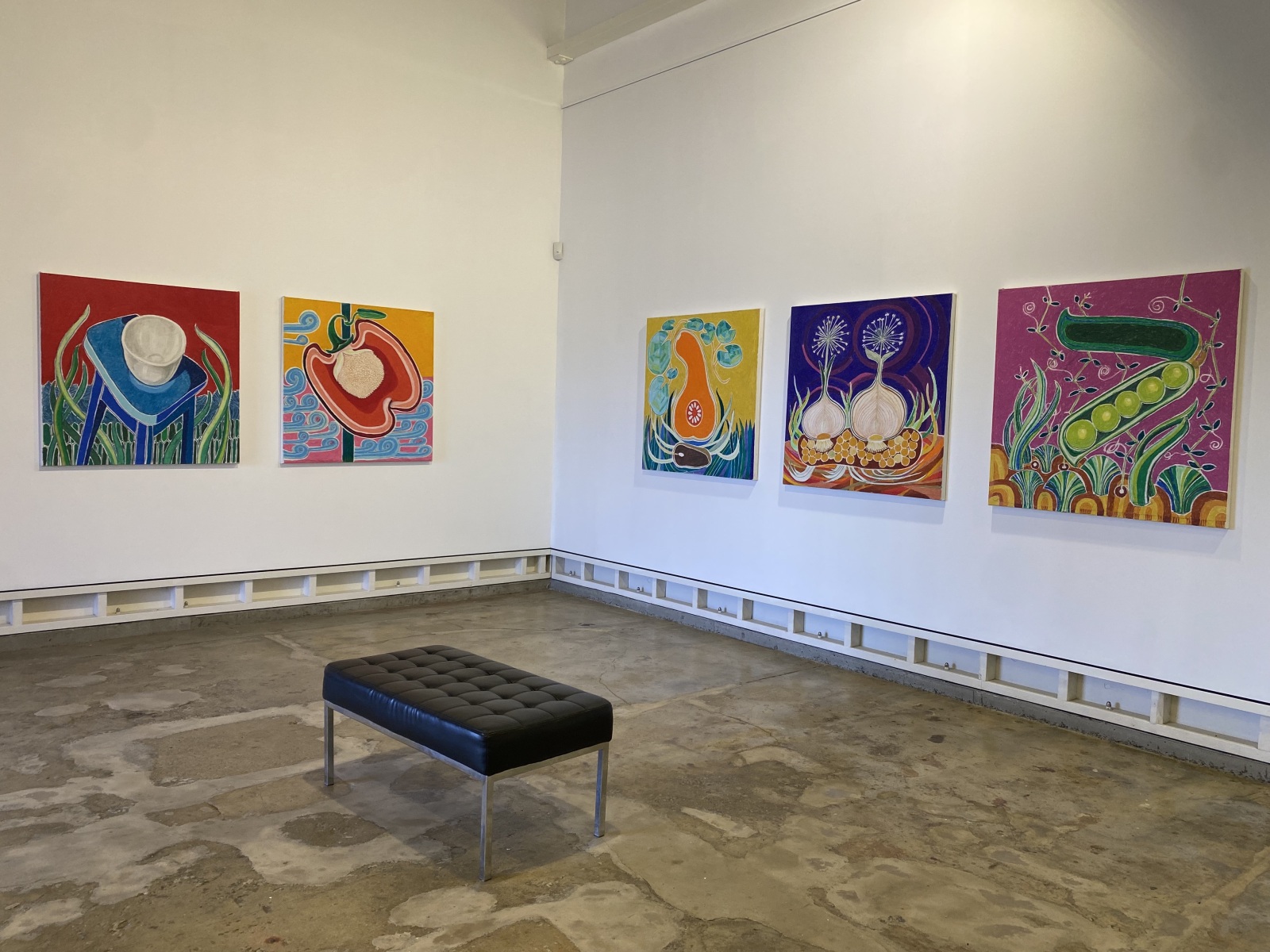Progress of Love, Adrienne Gaha’s latest exhibition at Edwina Corlette Gallery, is a fantastical dreamscape. Bright, saturated colours bleed across canvases; trees blur into an abstract haze; paint diffuses horizontally, revealing turpentine-distilled shades beneath. Against the clinically-white gallery space, the works appear like portals, each offering an insight into a different story. Gardens, dinner scenes, queens, lions, chandeliers, forest creatures, swans, and lovers occupy this visual narrative, each painting a microcosm of its larger historical and personal context.
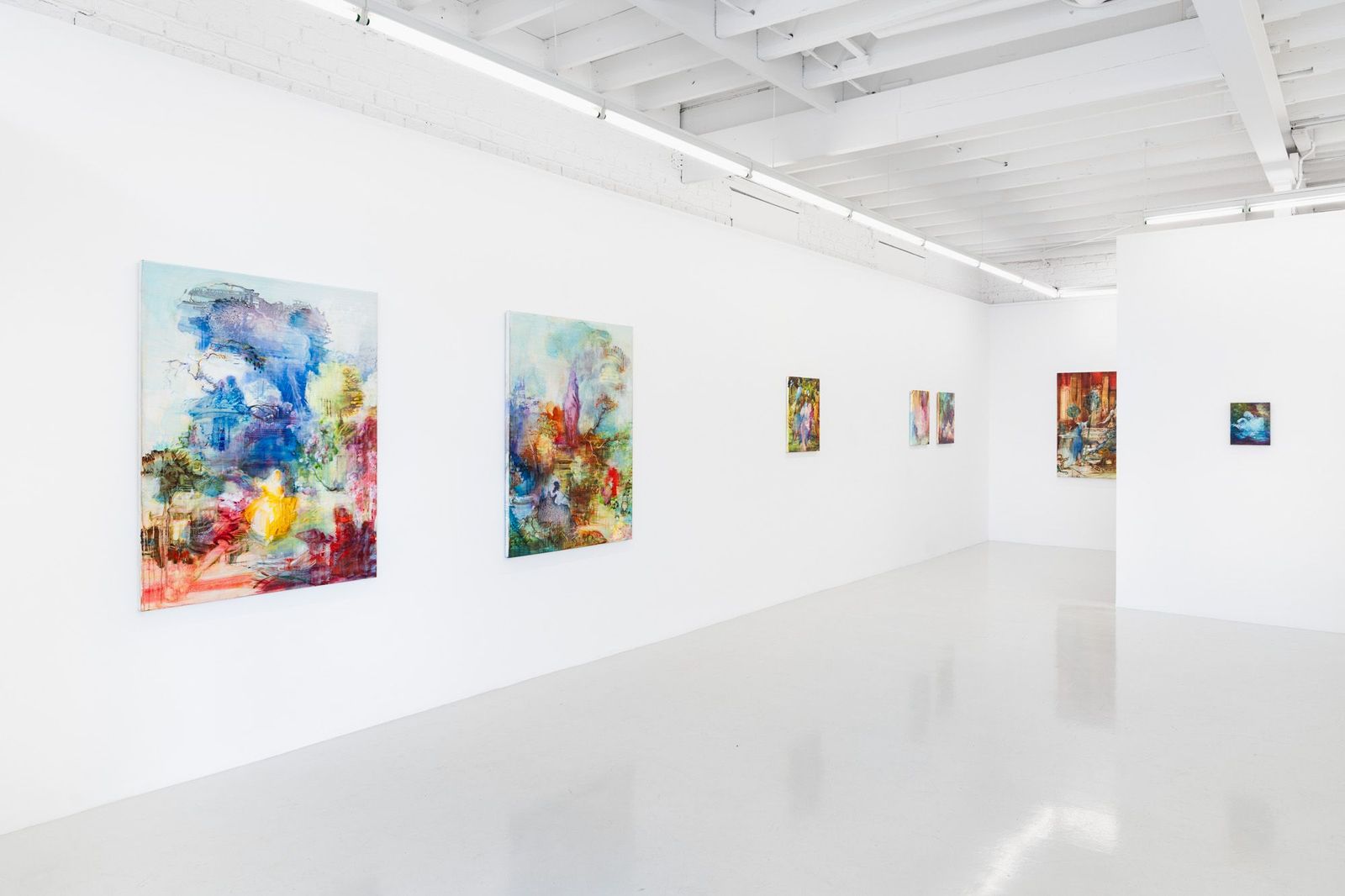
Gaha’s collection is inspired by Jean-Honoré Fragonard’s 1771-72 series, The Progress of Love. Where Fragonard’s scenes are grounded in the traditional figurative style, Gaha abstracts both the subject matter and painting technique itself with her expressionist, mark-making approach. This technique has been the focus of national and international acclaim – Gaha has been recognised as a finalist in the Grace Cossington Smith Painting Award in 2014 and 2015, and for the Geelong Contemporary Painting Prize in 2014. In the exhibition text provided by Edwina Corlette Gallery, Gaha states:
“My Progress of Love exhibition is based on images that have often been in my studio for many years. I revisit them through the changing lens of my age and current concerns. They are old friends, some I see often, some not for years. Some have to wait for the moment when I feel I can take them on. Drawn to these images in a subjective way, I explore them at first by painting the image. Inevitably there is a moment [when] the brush stroke or colour takes over and [starts] having a say on the progress of the painting”.
This process of departure and return mirrors Fragonard’s series, originally commissioned by Madame du Barry, the last maîtresse-en-titre of King Louis XV of France. She rejected the works, instead favouring a neoclassical painter. After neglecting the paintings for twenty years, Fragonard re-stretched them and continued to add to the series in obscurity. The Progress of Love gained popularity in the 19th century London art market, and several of these works are currently held in The Frick Collection in New York. Gaha has referred to Fragonard’s works as a ‘starting point’ for several of her own works, and audiences can draw connections between not only the title and subject matter of the two series, but also the artists’ approach to their creations and the success that can be found in returning to ‘old friends’.
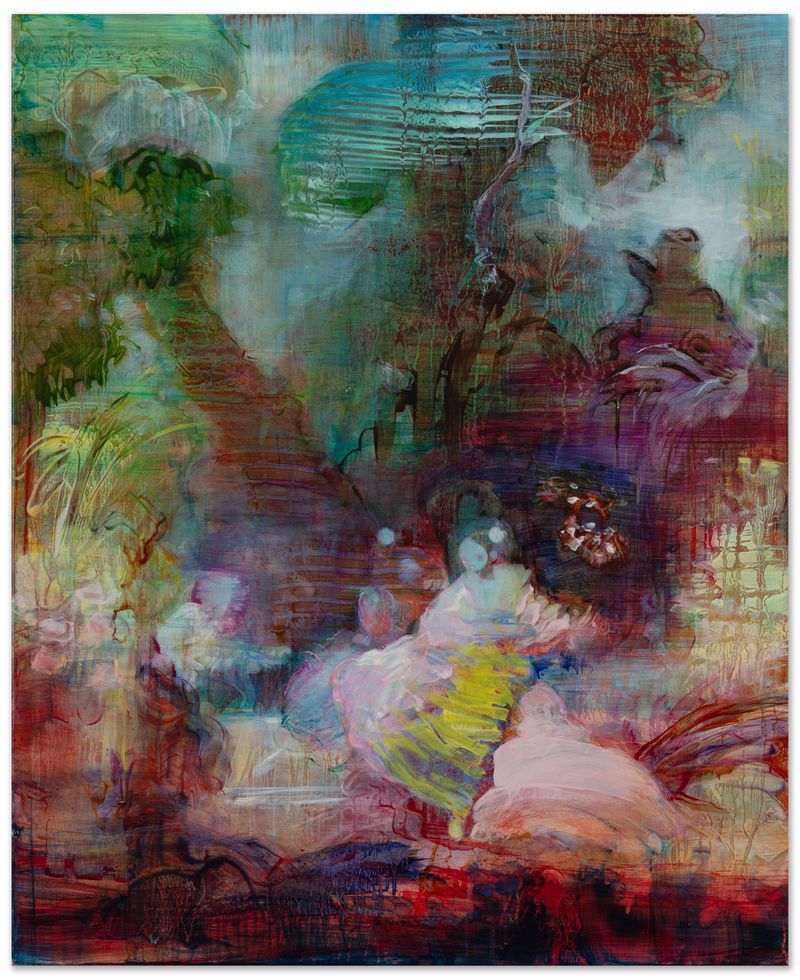
Throughout both Progress of Love and her career, Gaha has mastered her signature balance of figuration and abstraction. Her work is a juxtaposition: the colours are hazy, yet saturated; the pieces carefully composed, yet abstract; the subjects obscured, yet the clear centrepiece of each work. Gaha’s process involves layering and disrupting oil paint, scraping back the layers, and distilling and distorting the paint with turpentine to create a dreamscape quality. She repeats this process with each work until she has reached the desired effect: wiping back with turpentine, glazing and dripping paint to form layered, multifaceted and transitional works.
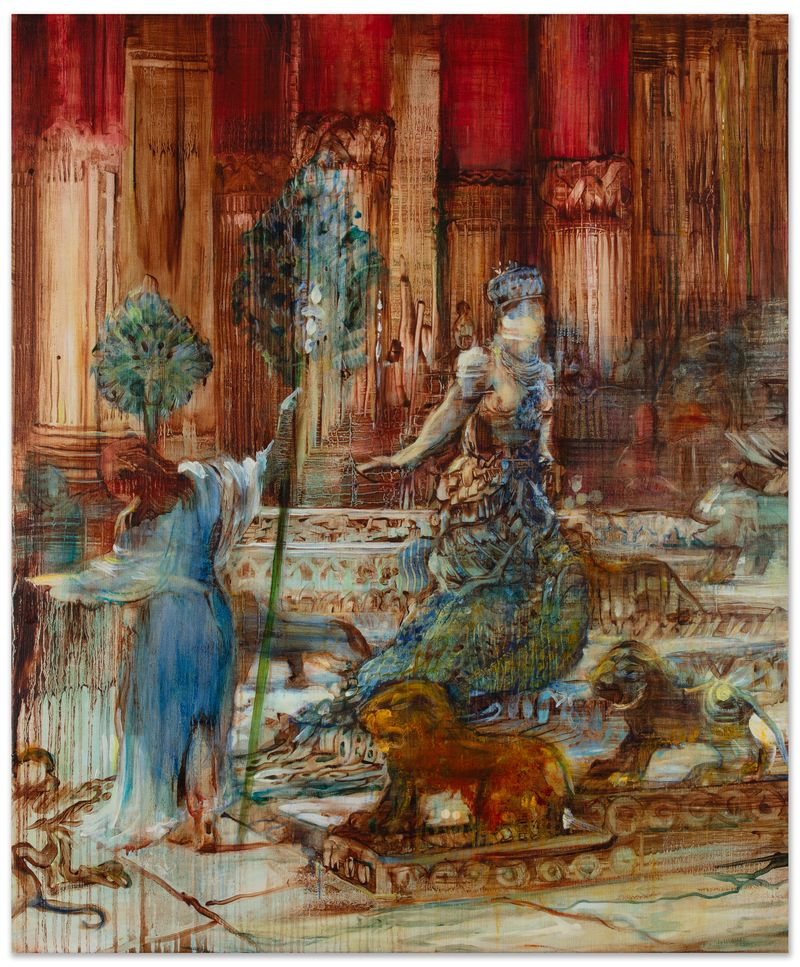
In Queen of Sheeba (2025), one of the more figurative works in Progress of Love, paint is applied and removed with solvent to form figures, columns, texture, and movement. The blank sections left behind resemble relief printing, as figures and forms emerge through the contrast of paint and empty space. Saturated reds, blues and oranges are distilled on the canvas to create Gaha’s signature effect; the details in the lion statues, stairs and tree leaves are revealed by scratching back into the wet paint. This is how Gaha creates such striking juxtaposition: the image resembles intricate fine china, despite being the result of a decidedly abstract approach – gestural mark-making, chemical reactions, and the natural movement of liquid paint.
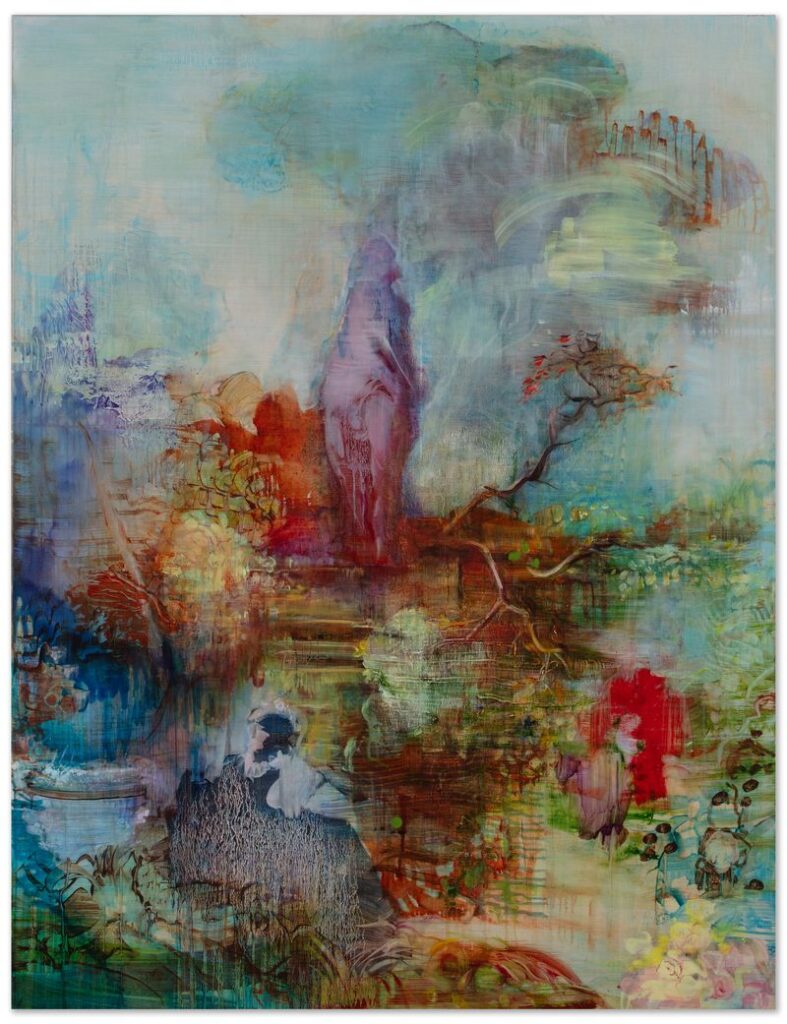
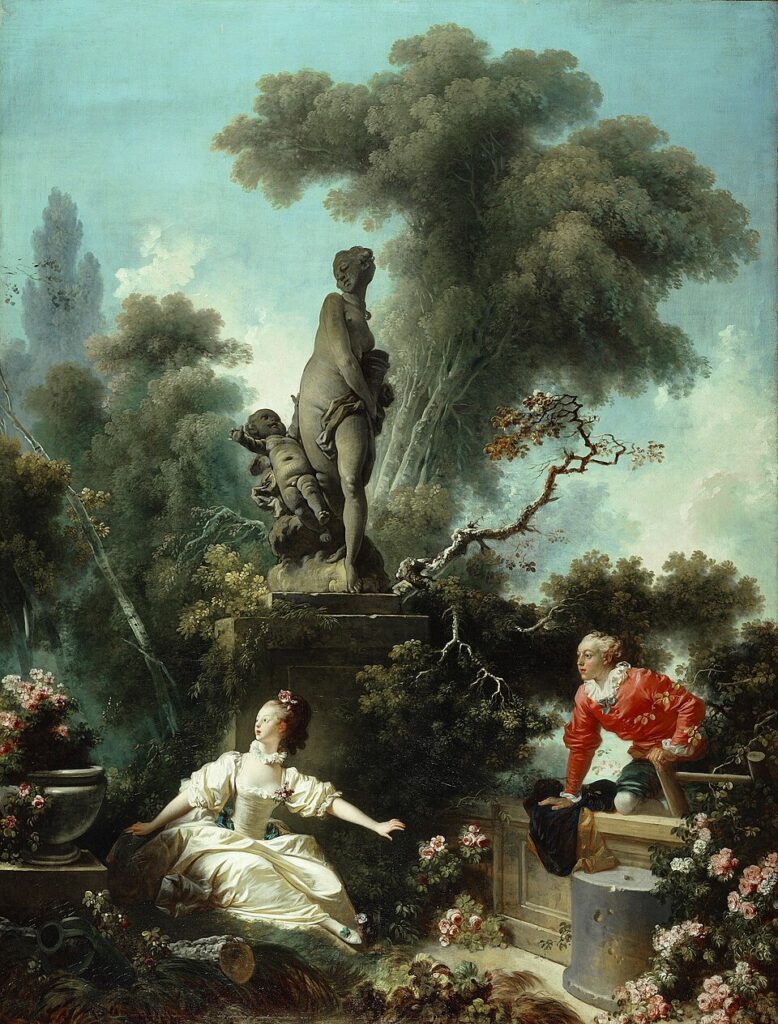
The Pursuit [Mauve] (2025) is both a reference and contrast to Fragonard’s The Meeting (1771-72). In both paintings, a figure stands in the lower foreground of a garden, while a large tree and sculpture loom overhead. In Gaha’s abstract interpretation, we can make out shapes and figures through the use of colour – red and blue people, a purple statue, blurred green and brown leaves. Fragonard’s original presents a complete scene, while Gaha’s take and title encourage us to question the circumstances of the characters’ relationship. She applies a layer of abstraction to not only the physical application of the paint, but also the emotional context of the work; we are led to wonder whether the woman is extending her arm to keep the pursuer away, or if there is a level of reluctance or danger to the encounter. This is a prime example of Gaha’s signature technique – brown paint diffuses horizontally across the canvas; repetitive scratching forms tree branches and leaves; glazes react to warp the image. It is this approach that brings her references to Fragonard’s work to life – her pieces uproot traditional ideals fixed in the figurative style, each interpretation is simultaneously reinvigorated and reimagined.
While Progress of Love is deeply rooted in historical context, it is also layered and distorted with Adrienne Gaha’s modern abstraction, views and interpretations. She describes her painting language as a dialogue with “nostalgia, frivolity, escapism and decay”; a dialogue that can certainly be heard throughout this series. Grounded in the past, yet breaking free and bolting towards the future, the works across Progress of Love are the culmination of decades of exploration, experimentation and refinement; an escape into Gaha’s world of fantasy and abstraction.
References
McCarthy, C 2021. Adrienne Gaha ‘Progress of Love’: About, Edwina Corlette Gallery, accessed July 2025, < https://edwinacorlette.com/exhibitions/143702_adrienne-gaha-progress-of-love#~bio>
Chloe Lethbridge Salt is a freelance writer and artist based in Meanjin/Brisbane. Across her practice, she explores themes of everyday rituals, family dynamics, and belonging.

